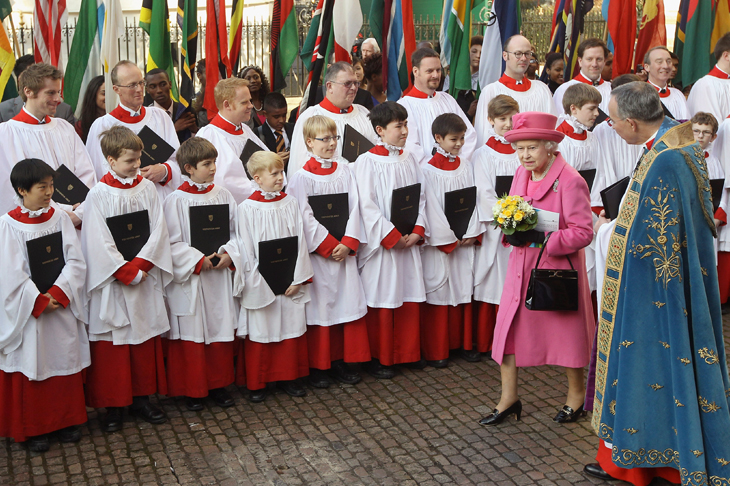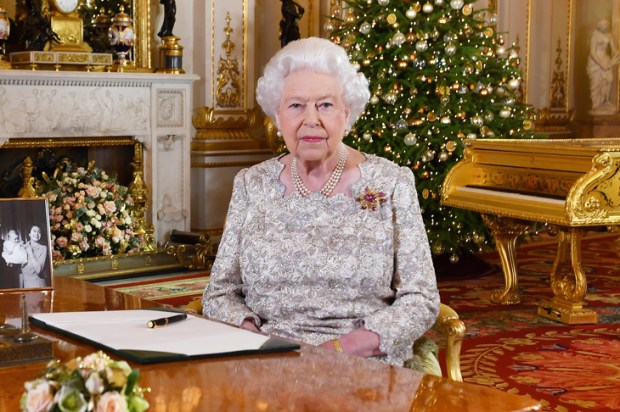The most bogan of us have been touched by the centuries-deep richness of British ritual and reverence this past fortnight. We have been given a glimpse of that exotic land, the Christian past, where people are different; and a poignant sense that the present might be missing something.
It is a platitude that politics is downstream of culture, and culture is downstream of religion – where ‘religion’ means the prevailing structure of meaning that binds a community and shapes its character.
Our new king evoked this cascading stream from Christian religion to Anglo-Saxon values to political liberties in his first address after Queen Elizabeth’s death: ‘In that faith, and the values it inspires, I have been brought up to cherish a sense of duty to others, and to hold in the greatest respect the precious traditions, freedoms and responsibilities of our unique history and our system of parliamentary government.’
We who stand at the bottom of that cascade are custodians of a heritage unmatched in all history for nurturing liberty and resisting tyranny. No small part of this liberty is thanks to the genius of our system of constitutional monarchy, which deals better than any other system with the problem of power.
In this system, a house-trained, harmless and gracious Crown gets all the glory but no real power, in order to keep those with all the political power in a glory-free zone, for the good of their souls.
We are spared a politicised president at the pinnacle of society with all the divisiveness that comes with it. Under our system, power percolates upwards from the parliament and the prime minister to the real symbol of headship and unity, the Crown: ceremonially in the monarch and functionally in our governor-general as head of state. And there, power simply evaporates harmlessly, since the head of state has no real power other than to say no to gross abuses by prime ministers.
Daniel Hannan points out, in How we Invented Freedom, that it took time and effort to produce a tame monarchy: ‘The story of the English-speaking peoples is the story of how they imposed their will upon their rulers.’ We know about Magna Carta and bad King John and how the barons had to bring his abuses to heel at Runnymede. Indeed, A.A. Milne’s poem reminds us that ‘King John was not a good man, He had his little ways, And sometimes no one spoke to him for days and days and days.’ But few know that two centuries earlier, in 1014, the Anglo-Saxon Witan council had already read the riot act to another King, Æthelred the Unredy, allowing him to keep the throne only if he refrained from unjust taxation and honoured ‘the good old laws’ of England.
Other teachable moments for overbearing kings included the beheading of Charles I by Cromwell’s men in 1649 for attempting ‘to overthrow the rights and liberties of the people’ and the exile of James II in 1688, with legislation passed such that all future monarchs would be subject to the laws of parliament.
Finally, in 1776 the revolutionaries in America fought the second English civil war. King George III was again the tyrant breaking his contract with the people, and he had to be put in his place.
So by these struggles, the culture of individual liberty, rule of law and a ferocious sense of the fair go were defended, and the institution of a well-behaved constitutional monarchy was established.
This curious institution, which all Australians are blessed to live under, has made possible the entirely benign and unifying reign of our late Queen Elizabeth, far above the sordid world of politics.
The package deal of ordered liberty under an apolitical Crown is the greatest gift of Anglo-Saxon culture to the world and a model for any nation. Hannan writes, ‘Anglo-Saxon values, as Richard Dawkins might put it, are a meme rather than a gene. They can be transmitted without any genetic vehicle. They explain why Bermuda is not Haiti, why Singapore is not Indonesia, why Hong Kong is not China.’
The real question is whether these political values can remain vital if the higher cascades of culture and religion dry up. Can there be real conviction about the primacy of the individual over the collective, of conscience over coercion, of liberty over conformity, once the sustaining worldview is abandoned? That ancient worldview believed in the dignity of the individual soul, and therefore in its liberty, because it believed each soul is known and loved by God. It believed in the dignity of kings and queens, but only subject to the overarching moral authority of the crucified king who said, ‘my kingdom is not of this world’. That is why King Charles III will have the crown placed on his head by the Archbishop of Canterbury.
Other religious worldviews have long been vying for dominance, whether atheist or eco-pantheist, and these will cascade into cultural and political forms that give primacy to the state or the earth-system over individual liberty. Good luck with that.
But for now, the Christian worldview remains honoured in the ancient ceremonies and observances for a faithful and beloved Queen who told us, ‘The teachings of Christ and my own accountability before God provide a framework in which I try to lead my life.’
Sky News ran a beautiful tribute, Elizabeth II: a Life of Duty, but they fell at the final hurdle. The final comment noted the Queen’s close bond with her father, George VI: ‘If there is a heaven, she will have found herself face to face with her father; and the greatest motivation for her time as Queen is that he should say, “I am proud of you”.’
That is a sweet sentiment, but inadequate. If there is a heaven, the greatest motivation for both the Queen and her father is that they should hear the only words that matter: ‘Well done, good and faithful servant’.
Vale Elizabeth II, and may you not be our last Christian Queen.
Got something to add? Join the discussion and comment below.
Get 10 issues for just $10
Subscribe to The Spectator Australia today for the next 10 magazine issues, plus full online access, for just $10.
You might disagree with half of it, but you’ll enjoy reading all of it. Try your first month for free, then just $2 a week for the remainder of your first year.














Comments
Don't miss out
Join the conversation with other Spectator Australia readers. Subscribe to leave a comment.
SUBSCRIBEAlready a subscriber? Log in